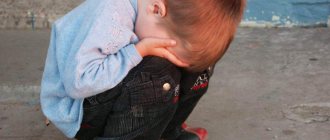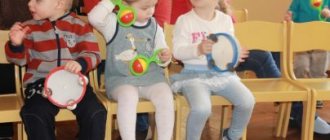Author of the article: Lina Smirnova Last modified: January 2021 8605
The purpose of parental rights is to ensure a full, safe life for the child. Sometimes parents, using their rights, dictate their will to the child, forcing him to act against his interests. In such cases, parental rights are abused. It can affect the normal physical and mental development of the child and create difficulties in his education. Therefore, if there is an abuse of their rights on the part of parents, they must bear responsibility in accordance with current legislation. Let's consider what actions of parents can be classified as abuse of the rights given to them, what types of punishments for this are provided for in the RF IC, how such offenses are proven, and when the issue of punishment is decided in court.
What is the meaning of parental rights?
The legislation clearly defines the purpose of assigning parental rights. It consists of caring for the child’s health, as well as his physical, spiritual, psychological and moral development.
Expert commentary
Gorchakov Vladimir
Lawyer
According to Article 63 of the RF IC, parents are given preferential rights over other citizens to raise and educate their child. When exercising their rights, they are obliged to create conditions for the child to receive a basic education. They have the right to choose the methods of the educational process when exercising their parental rights independently. For example, they, at their own discretion, can choose an educational institution for the child to receive a general elementary education, determine the way the child receives education and the form of his education, taking into account his opinion. At the same time, certain restrictions are established in their actions.
According to Article 65 of the RF IC, when exercising their rights, parents do not have the right to:
- cause physical and mental harm to the health of your child;
- ignore the moral aspects of child development adopted by the state;
- treats the child with disdain, humiliates him as a person;
- show cruelty, rudeness and insult to him;
- exploit a child to the detriment of his interests.
Thus, the essence of parental rights is not only the capabilities of the parent in the educational process of the child, but also his responsibility for exercising his rights without prejudice to the interests of the child.
The legislative framework
If possible, parents who find themselves in a difficult situation should definitely familiarize themselves in detail with the entire legislative framework on this topic.
The most important legal document is the following:
| Indicators | Description |
| Article No. 54 of the RF IC | the child’s right to residence, as well as education directly in the family |
| Article No. 55 of the RF IC | the right of a minor to unhindered communication with all his relatives (unless otherwise provided by a court decision) |
| Article No. 56 of the RF IC | whether the child has the right to receive protection |
| Article No. 57 of the RF IC | the child's right to express his or her own opinion |
| Article No. 60 of the RF IC | various types of property rights of the child |
| Article No. 59 of the RF IC | the child’s right to change the child’s name, surname and patronymic |
| Article No. 73 of the RF IC | how exactly does the restriction occur? |
| Article No. 74 of the RF IC | what are the consequences |
| Article No. 75 of the RF IC | does the parent have the right to have any contact with the child in the event of deprivation |
| Article No. 76 of the RF IC | implementation of the procedure |
| Article No. 77 of the RF IC | how exactly is a child removed from a parent if abuse is discovered? |
| Article No. 79 of the RF IC | How is a court decision made on this matter accepted for execution? |
The legislative framework on this issue is extremely extensive. But it is still worthwhile, if possible, to familiarize yourself with it all in full.
In this way, it will be possible to avoid the emergence of all sorts of controversial and even conflict situations that require resolution in court.
Despite ongoing support for the demographic situation in our country, precedents for abuse of parental rights still occur.
That is why it is worth carefully studying all the issues that are in one way or another related to the procedure for considering such cases.
Attention!
- Due to frequent changes in legislation, information sometimes becomes outdated faster than we can update it on the website.
- All cases are very individual and depend on many factors. Basic information does not guarantee a solution to your specific problems.
That's why FREE expert consultants work for you around the clock!
- via the form (below), or via online chat
- Call the hotline:
- 8 (800) 700 95 53
APPLICATIONS AND CALLS ARE ACCEPTED 24/7 and 7 days a week.
Types of parental abuse recognized by law
First, let us clarify what is meant by the concept of abuse of law.
Abuse means the exercise of parental rights using actions aimed at suppressing the will of the child and ignoring his interests.
The legislation identifies the main types of parental abuse for which liability is provided. These include:
- obstacles in the child’s education and general education;
- forcing him to engage in illegal activities: theft, begging, prostitution;
- addiction to alcoholic beverages and drugs;
- an obstacle to communication with relatives, for example, with paternal grandparents and the father himself, when the child lives with his mother;
- other actions towards a child that will be recognized by law as illegal and not meeting moral standards.
For example, parents' obstacles to their child's education may manifest themselves directly in a ban on attending school under the pretext that the child will be educated at home, or due to fear of the unfavorable influence of the school atmosphere on the child. In fact, these parents often turn out to be representatives of religious sects or have mental disorders.
What it is
Read also: Parents' responsibility for improper performance of their duties
What does abuse of rights mean, and where are the corresponding powers for parents? The legislation contains the largest possible volume of guarantees aimed at respecting the rights and legitimate interests of minor citizens. The implementation of the rights granted to the child’s parents must correspond to the interests of the minor. Let us highlight the main block of rights that the law provides to the biological or adoptive parents of a child:
- to participate in the development and upbringing of one’s own or adopted child;
- to participate in education , including the choice of educational institution;
- to communicate with a minor child , taking into account his interests, judicial or legislative prohibitions.
Naturally, the listed list of powers is implemented in practice in the form of specific actions or inactions, the behavior of the mother or father.
It is not considered abuse to commit actions or actions that differ from standard methods and methods of education if they are aimed at benefiting the child. Such actions will be assessed by guardianship and law enforcement agencies, courts and the prosecutor's office, and the commission on juvenile affairs.
The law entrusts parents with protecting the rights of children - through representation in judicial and other departments, ensuring decent living conditions and development, and material maintenance. However, if the mother and father themselves abuse their rights, the interests of the child are threatened or directly violated. Judicial practice contains a number of signs that allow us to conclude that the rights of the mother or father are being abused:
- if parents exceed reasonable and safe limits when exercising their rights. For example, such cases include unlawful retention of a child for communication after the parents’ divorce;
- if the exercise of rights by parents is carried out to the detriment of the interests of the child, or creates a threat of causing such harm;
- if parents show rudeness, rudeness, obscene language or other elements of inappropriate behavior towards the child;
- if biological or adoptive parents involve children in an illegal lifestyle - involvement in begging or theft, inducement to use alcohol, tobacco or narcotic substances;
- if the mother or father commits actions or inactions aimed at impeding the normal development, education or upbringing of children.
This is only an approximate list of situations and actions in which abuse of rights on the part of parents can be recorded. The court will give an accurate assessment of such actions, since abuse makes it possible to deprive unscrupulous parents of their rights in relation to their own child.
Responsibility of parents for their abuse of rights
In the situations discussed above, for exceeding one’s parental authority, liability is provided, both criminal and civil. If it is impossible to resolve the situation peacefully with the help of guardianship authorities, social services and other government organizations designed to protect the interests of the child, the problem will have to be resolved in court.
The legislation defines penalties for abuse of parental rights in the form of:
- temporary restrictions on parental rights;
- complete deprivation of parental authority;
- criminal punishment on the basis of the Criminal Code of the Russian Federation.
Expert commentary
Potapova Svetlana
Lawyer
When a parent prohibits a child from communicating with close relatives because he himself does not have a good relationship with them, this is also an abuse of parental rights on his part, and is subject to prosecution on the basis of Article 67 of the RF IC.
Often in dysfunctional families, drinking parents from an early age accustom their children to theft, begging, and prostitution. If this happens systematically, and the money received by the child from such activities is taken by the parents into the family budget, then they should be subject to criminal punishment under Article 240 of the Criminal Code of the Russian Federation for malicious abuse of their parental responsibilities.
Inducing a child to drink alcohol is a normal phenomenon in such families. Parents intentionally introduce their child to drugs and alcohol or do not stop him when he himself takes the initiative to become addicted to addictions. All this can be interpreted as an abuse of parental rights, and criminal penalties are also provided for this.
Important! Not only biological parents, but also officially appointed guardians of children can be held accountable for exceeding their powers.
Consequences of deprivation
A parent deprived of rights to a child is not released from child support obligations. Alimony will be collected immediately in one proceeding based on the claim of the second party. You will have to pay alimony as a share of your salary, or in a fixed amount.
Despite the child support obligations, the deprived parent will not be able to collect child support from the adult child in the future. Also, he does not have the right to enter into an inheritance in the event of the death of his son or daughter, but they can.
Important! If the person deprived previously applied for benefits and allowances for children, they are cancelled. He will also not be able to communicate with the child and participate in his upbringing.
How is abuse of rights detected?
The basis for applying punishment for such offenses should be the facts of identified abuse of parental rights.
Evidence for the court may include:
- witness's testimonies;
- medical certificates and commission conclusions;
- acts of inspection of conditions in the family by guardianship authorities;
- protocols and certificates from the Ministry of Internal Affairs;
- the opinion of the child himself, if he is 10 years old;
- information from school about the child’s behavior and academic performance.
Neighbors living next to a dysfunctional family, relatives of the mother and father, teachers or kindergarten teachers can act as witnesses in court.
For example, a physician’s conclusion about the presence of traces of alcohol or drugs in the blood taken from a child can confirm that the child may be involved in their use. The protocol submitted by the police may contain information about the detention of a child for theft. Neighbors can confirm that a child is begging.
Also, the child himself can simply tell about existing violations of his rights. Only his testimony must be heard in the presence of a representative of the guardianship or a guardian who is not a party to the process.
Possible difficulties
If we are talking about deprivation due to abuse of rights, the easiest way to achieve this is if the parent has committed a crime against the child (induced him to begging, vagrancy). In other cases, abuse alone is not enough for the courts (for example, a ban on communication with the second parent), and additional grounds are required. Therein lies the problem. In addition, the evidence must be irrefutable, and obtaining it can be problematic.
Sources
- https://lawinfo24.ru/family/lishenie/zloupotreblenie-roditelskimi-pravami
- https://prosud24.ru/zloupotreblenie-pravami/
- https://www.kraskizhizni.com/family/1248-tipichnye-oshibki-roditeley
- https://glavny-yurist.ru/zloupotreblenie-roditelskimi-pravami.html
- https://obrakah.ru/prava/chto-oznachaet-zloupotreblenie-roditelskimi-pravami.html
- https://zakonguru.com/semejnoje/roditelskije-prava/zloupotreblenie.html
Sequence of actions when solving a problem in court
A difficult situation created by one parent, due to his abuse of the rights of a parent, may force the second parent or the minor child to seek help from the Department of Internal Affairs, guardianship authorities or the prosecutor's office. They are obliged to respond to their appeal and take measures adequate to the current situation. If both parents violate the child’s rights, the guardianship authorities should deal with the problem, involving the prosecutor’s office if necessary.
When all methods of pre-trial resolution of the problem have been exhausted, and they have not helped eliminate the violations by the parents of their rights, then the only remaining option is to consider the case in court.
The process of bringing to justice through the court should take place in the following sequence:
- identifying facts of abuse of rights;
- collection of documents confirming established facts;
- initiation of proceedings in court on the basis of a filed claim;
- consideration of all presented materials and testimony of witnesses at the court hearing;
- adoption by the court of a final decision either on the deprivation of rights or on their limitation.
Expert commentary
Kolesnikova Anna
Lawyer
If during the court hearing facts of abuse that fall under criminal liability are recognized, then the prosecutor's office should initiate a criminal case against the parent.
Arbitrage practice
Most often, courts satisfy demands for restriction or deprivation of rights for abuse of them. When going to court, plaintiffs present maximum evidence, so the chance of a successful resolution of the issue is quite high.
Here are some examples of court decisions:
- Decision No. 2-1148/2019 2-1148/2019~M-1041/2019 M-1041/2019 dated December 17, 2021 in case No. 2-1148/2019.
- Decision No. 2-1953/2019 2-1953/2019~M-1886/2019 M-1886/2019 dated December 5, 2021 in case No. 2-1953/2019.
- Decision No. 2-1855/2019 2-1855/2019~M-1779/2019 M-1779/2019 dated November 26, 2021 in case No. 2-1855/2019.
In the above cases, there was not only abuse, but also failure to fulfill parental obligations, so the courts considered all factors together.
How is the issue resolved in court?
Before making a decision, the judge will comprehensively consider all the evidence presented, including the psychological situation in the family and its moral prospects, listen to the arguments of the defendants, and take into account the circumstances that caused the offenses. But in any situation, the court always proceeds from the interests of the child. His opinion, if he has reached the age of ten, is taken into account, but is not decisive because the child cannot yet objectively assess what is good for him.
Based on all the circumstances and established facts of the offense, the judge decides on the extreme measure of civil liability for this offense - deprivation of parental rights. But a court decision to temporarily limit a parent or both parents in their rights can be made in the following facts:
- their abuse of their rights occurred sporadically;
- parents’ intentions are aimed at correcting the current situation;
- Temporary residence of a child in a children's institution brings him, according to guardianship representatives, psychological discomfort.
In order for the situation created by the parents after the restriction of their rights to improve, they are given a period of 6 months. When this period has passed, the court, depending on the situation in the family and the mood of the parents, will either restore their rights again or completely deprive them of their rights. The latter decision will be favored by the fact that the child has a close relative, for example an aunt or grandmother, who is ready to become his official guardian, and the child will live much more comfortably with him than in the parents’ family.
Arbitrage practice
Case No. 1
Representatives of the guardianship and trusteeship service filed a claim with the Sosnovsky District Court of the city of Chelyabinsk for abuse of parental rights in a local family. A school teacher contacted the child welfare service after noticing abrasions and bruises on the hands of a fifth-grader. In response to the teacher’s questions about the origin of such bruises, fifth-grader N. remained silent. After interviewing the family's neighbors at the entrance, the guardianship authorities found out that the child's father had recently returned from prison. The guardianship authorities assumed beatings.
Shortly before the court hearing, the child was detained in one of the local stores for attempting to steal alcohol. At the court hearing, the former criminal admitted that he beat his son and forced him to steal alcohol under the threat of beatings.
The court found him guilty of forcing a child to steal, assault and cruelty to a child and deprived him of parental rights, in accordance with Art. 69 of the Family Code of the Russian Federation.
Case No. 2
The father of the child appealed to the Perm City Court in order to establish the fact of abuse of parental rights by his mother. After the divorce, the mother not only forbade the child to see his father and his parents, but also stopped letting the child go to school and taught her at home. The mother did not make contact with teachers and guardianship authorities.
As a result of the investigation, it was established that the mother had abused her parental rights, but, taking into account the mother’s mental illness, the court limited the mother’s rights and determined the child’s place of residence with his father, allowing the child to visit the mother in the presence of relatives.
Case No. 3
The child’s maternal grandmother appealed to the Yekaterinburg City Court after her death with a claim that the child’s father was abusing his parental rights by not allowing the child to see his grandmother, and also in order to obtain a court decision on the child’s living with her.
After the investigation, at the court hearing, witnesses stated frequent facts of the father’s abuse of alcoholic beverages, as a result, the court established the fact of abuse of parental rights by the child’s father. The court also ruled that it was undesirable for the child to live with either his father or his grandmother due to her advanced age and serious health problems, and the child was sent to an orphanage.
So, the abuse of their rights by parents leads to a violation of the rights of the child, and in the absence of the possibility of pre-trial settlement of the process, the guardianship authorities or relatives go to court, and the court limits or deprives the parents of their rights depending on the specific circumstances.





